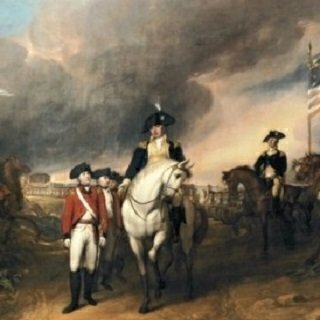Today marks the anniversary of the American victory at Yorktown, which effectively ended the Revolutionary War. But did you know the British Army surrendered to a Lincoln, and not a Washington on that fateful day?
 Benjamin Lincoln came to the battlefield in Virginia from Massachusetts, where he was an elected official who became a militia leader. He was no relation to the future president, Abraham Lincoln. (Ironically, future Confederate general Robert E. Lee’s father, Light Horse Harry Lee, was also at the Yorktown surrender.)
Benjamin Lincoln came to the battlefield in Virginia from Massachusetts, where he was an elected official who became a militia leader. He was no relation to the future president, Abraham Lincoln. (Ironically, future Confederate general Robert E. Lee’s father, Light Horse Harry Lee, was also at the Yorktown surrender.)
The combined American and French forces had moved quickly to surround British and German forces led by Lord Cornwallis that had withdrawn to Virginia in September 1781. Over the course of a month, troops led by George Washington, the Marquis de Lafayette and the Comte de Rochambeau cut off Cornwallis’ group of 7,000 troops from being resupplied by British naval forces – aided by a key French naval victory.
On October 17, 1781, aides appointed by Cornwallis started surrender negotiations with Washington’s subordinates. One surrender condition seemed harsh and it was related to Lincoln’s treatment by Cornwallis’s superior officer, General Henry Clinton.
A little over a year earlier, Clinton had forced Lincoln to surrender his force of about 5,000 troops after British forces laid siege to Charleston, South Carolina. Then Clinton insulted Lincoln by not allowing the Americans to surrender with honor by displaying their colors and playing a song to honor the British.
General Lincoln was then exchanged for another prisoner, and by the time of the Yorktown siege he was Washington’s second-in-command on the battlefield.
The British agreed to the Washington’s surrender terms, but then Cornwallis refused to meet Washington in public to finalize the surrender. Claiming he was ill, Cornwallis sent the Irish General, Charles O’Hara, with Cornwallis’s sword. The British-German forces were denied the same surrender honors as Lincoln’s forces had experienced in Charleston.
At the end of the surrender march, General O’Hara offered the sword to Washington, who turned to Lincoln and instructed Lincoln to receive O’Hara’s sword and supervise the surrender of arms.
Lincoln had managed to fight with bravery during the war and he was present at two key surrenders (Yorktown and Charleston), was wounded at Saratoga, and appointed to lead the Continental army in the South.
He was also highly respected by Washington and the Continental Congress, and 10 days after the Yorktown surrender Lincoln was appointed as the first Secretary of War. He remained in that position until final peace terms were negotiated with the British in 1783.
Lincoln played a key role in another significant event as the leader of the Massachusetts militia. He was asked by the state’s governor to lead a privately funded force to combat an uprising in western Massachusetts known as Shays’ Rebellion.
In February 1787, Lincoln led a surprise attack on Shays’ forces that ended the rebellion. The event so shook the young nation’s leaders that it drove a push for a Constitutional Convention in Philadelphia later that year.
Lincoln wasn’t a delegate at the Constitutional Convention, but he did attend the state ratification convention in Massachusetts, where he was a strong supporter of the new Constitution. After a brief political career in his home state, Lincoln was appointed to the lucrative position as Collector of Boston, where he remained until shortly before his death in 1810. Among his pallbearers was his good friend and neighbor, John Adams.
As a footnote, counties in the states of Georgia, Kentucky, Missouri, North Carolina, and Tennessee are called Lincoln in honor of Benjamin Lincoln and not President Lincoln.







